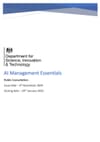⚡ Quick Summary
The UK Department for Science, Innovation and Technology (DSIT) introduces the AI Management Essentials (AIME) tool—a self-assessment questionnaire aimed at helping organisations benchmark and improve their AI management practices. Built on ISO 42001, NIST RMF, and the EU AI Act, AIME provides a structured but accessible entry point for startups, SMEs, and departments within larger organisations to assess governance maturity across ten dimensions, from fairness to third-party communication.
🧩 What’s Covered
1. Purpose and Audience
- AIME is not a certification or compliance tool. It’s designed as a baseline self-assessment for any organisation developing or using AI systems, with a focus on accessibility for startups and SMEs.
- It evaluates organisational processes, not the AI systems themselves.
- Built from a literature review and pilot-tested with regulators, techUK, and business users .
2. Underlying Frameworks
- Synthesizes key governance elements from:
- ISO/IEC 42001 (AI management systems)
- NIST AI RMF (risk-based controls)
- EU AI Act (risk classification and obligations)
- Aligns conceptually with the OECD Hiroshima Process but targets a broader range of AI maturity levels .
3. Tool Structure
AIME contains 10 thematic sections, grouped into 3 clusters:
A. Internal Processes
- AI System Record: Inventory and update procedures
- AI Policy: Roles, responsibilities, review cycles
- Fairness: Definitions, detection, monitoring of unfair outcomes
B. Managing Risks
- Impact Assessment: Legal, psychological, societal effects
- Risk Assessment: Design quality, thresholds, incident response
- Data Management: Provenance, completeness, representativeness
- Bias Mitigation: Procurement due diligence, AIaaS scrutiny
- Data Protection: DPIAs, breach documentation, third-party security
C. Communication
- Issue Reporting: Internal and external channels, anonymity options
- Third-Party Communication: Tech and non-tech documentation for stakeholders
Each section includes:
- Yes/no/multiple-choice questions
- Tooltips with glossary-style definitions
- Skip logic to avoid irrelevant sections
- (Forthcoming) scoring system and improvement recommendations
4. Planned Additions (Post-Consultation)
- Health rating for each dimension
- Actionable improvement suggestions
- Possible future alignment with public procurement standards
💡 Why it matters?
This is the UK’s most practical AI governance support tool to date. AIME isn’t abstract—it’s specific, structured, and usable without expert knowledge. For SMEs trying to operationalize AI Act-style expectations, this tool lowers the entry barrier. It’s also a signal of how the UK may embed assurance expectations in procurement and regulatory alignment going forward.
❓ What’s Missing
- The tool is still in consultation draft—the scoring system and recommendations are not yet released
- Not yet integrated with existing UK regulatory expectations (e.g., ICO, CMA)
- While built on strong foundations, it avoids tougher questions about external assurance, incident transparency, or AI-specific ethics boards
- Focused on organisational maturity; no guidance on supply chain risk, model-level governance, or conformity assessment pathways
👥 Best For
- Startups and SMEs beginning to document or formalize AI governance
- Compliance teams preparing for eventual AI Act obligations
- Public sector units needing lightweight oversight tools for procured AI
- AI assurance providers looking to align services with future DSIT expectations
- Cross-functional governance teams who want a clear, plain-language framework to structure internal conversations
📄 Source Details
- Title: AI Management Essentials – Consultation Document (Draft)
- Publisher: UK Department for Science, Innovation & Technology (DSIT)
- Date: November 2024 – January 2025 consultation period
- Length: 26 pages
- License: Open-access consultation tool
- Built on: ISO/IEC 42001, NIST AI RMF, EU AI Act
- Contact: ai-assurance@dsit.gov.uk
📝 Thanks to DSIT’s AI Assurance team for providing a plain-English, actionable tool that meets orgs where they are—and encourages them to aim higher.


